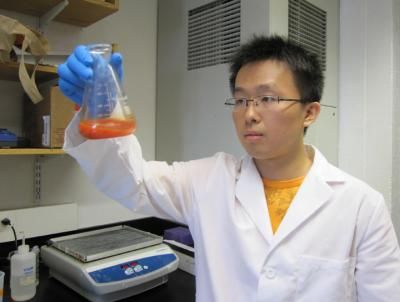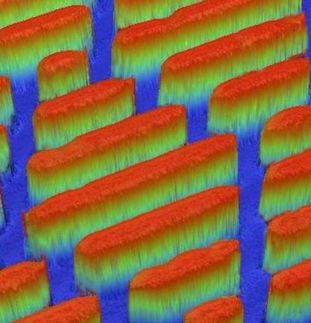Selenium suppresses staph on implant material
Advertisement
selenium is an inexpensive element that naturally belongs in the body. It is also known to combat bacteria. Still, it had not been tried as an antibiotic coating on a medical device material. In a new study, Brown University engineers report that when they used selenium nanoparticles to coat polycarbonate, the material of catheters and endotracheal tubes, the results were significant reductions in cultured populations of Staphylococcus aureus bacteria, sometimes by as much as 90 percent.

Qi Wang swirls a solution of selenium nanoparticles in the lab. Coatings of the nanoparticles appear effective in fighting staph bacteria in medical device materials, according to a new study.
Webster Lab/Brown University
"We want to keep the bacteria from generating a biofilm," said Thomas Webster, professor of engineering and orthopaedics, who studies how nanotechnology can improve medical implants. He is the senior author of the paper, published online this week in the Journal of Biomedical Materials Research A.
Biofilms are notoriously tough colonies of bacteria to treat because they are often able to resist antibiotic drugs.
"The longer we can delay or inhibit completely the formation of these colonies, the more likely your immune system will clear them," Webster said. "Putting selenium on there could buy more time to keep an endotracheal tube in a patient."
Meanwhile, Webster said, because selenium is actually a recommended nutrient, it should be harmless in the body at the concentrations found in the coatings. Also, it is much less expensive than silver, a less biocompatible material that is the current state of the art for antibacterial medical device coatings.
Webster has been investigating selenium nanoparticles for years, mostly for their possible anticancer effects. As he began to look at their antibiotic properties, he consulted with Hasbro Children's Hospital pediatrician Keiko Tarquinio, assistant professor of pediatrics, who has been eager to find ways to reduce biofilms on implants.

























































